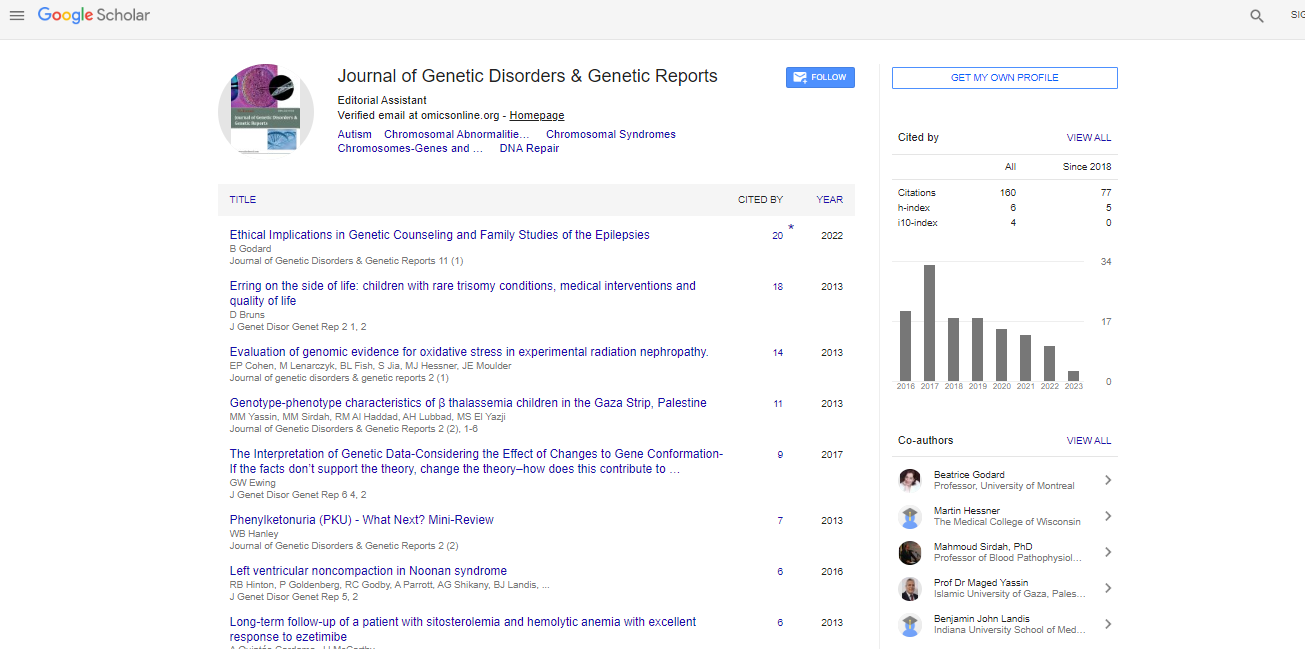Commentary, J Genet Disor Genet Rep Vol: 12 Issue: 3
Role of Genetic Factors and their Interaction in Life
Alex Ceron*
1Medicine and Stem Cell Research, University of California, San Francisco, USA
*Corresponding Author: Alex Ceron,
Medicine and Stem Cell Research,
University of California, San Francisco, USA
E-mail: ceronalex@gmail.com
Received date: 15 May, 2023, Manuscript No. JGDGR-23-106018;
Editor assigned date: 17 May, 2023, PreQC No JGDGR-23-106018 (PQ);
Reviewed date: 01 June, 2023, QC No JGDGR-23-106018;
Revised date: 08 June, 2023, Manuscript No JGDGR-23-106018 (R);
Published date: 16 June, 2023, DOI: 10.4172/2576-1439.1000205
Citation: Hella L (2023) Role of Genetic Factors and their Interaction in Life. J Genet Disor Genet Rep 12:3.
Abstract
Description
Genetic factors play a pivotal role in the development and functioning of all living organisms. They provide the foundation upon which physical characteristics, behaviors, and susceptibilities to diseases are built. However, the influence of genetics is not deterministic, as genes interact with each other and with the environment, giving rise to the complexity and diversity of life.
Genetic factors
Genetic factors are the fundamental building blocks that define an individual's genetic makeup. They are encoded in Deoxyribonucleic Acid (DNA), which comprises genes that carry the instructions for synthesizing proteins. Each gene contains specific information that determines traits, such as eye color, height, and susceptibility to certain diseases. The collective action of these genetic factors shapes an individual's phenotype—the observable characteristics resulting from the interaction of genes with the environment.
Interaction among genes
Genes rarely act in isolation. Instead, they form intricate networks and interact with one another within the genome. These interactions occur through various mechanisms, such as gene regulation, gene expression, and genetic pathways. Genes can enhance or suppress the effects of other genes, leading to a wide range of outcomes. The interconnectedness of genes creates a complex web of interactions, influencing the expression and functioning of genetic factors.
Gene-environment interplay
The interaction between genetic factors and the environment is a crucial determinant of an individual's development. Genetic factors provide the blueprint, while the environment provides the context in which genes are expressed. Environmental factors, such as nutrition, exposure to toxins, stress, and social interactions, can modify gene expression, altering the trajectory of development. This dynamic interplay between genes and the environment is known as geneenvironment interaction, highlighting the joint influence of nature and nurture.
Genetic factors in disease
Genetic factors significantly contribute to the risk and susceptibility to various diseases. Certain genetic variations or mutations can increase the likelihood of developing specific conditions, such as inherited disorders or predispositions to complex diseases like cancer, diabetes, or heart disease. However, it is important to note that genetic factors alone do not guarantee the development of a disease. The interplay between genetic predisposition and environmental factors, such as lifestyle choices and exposure to risk factors, plays a critical role in disease manifestation.
Precision medicine
The understanding of genetic factors has revolutionized the field of medicine, leading to the emergence of precision medicine. By considering an individual's unique genetic makeup, clinicians can tailor treatment plans to optimize therapeutic outcomes and minimize adverse effects. Genetic testing and genomic sequencing enable the identification of specific genetic variations, allowing for personalized interventions and targeted therapies. Precision medicine holds great promise in improving disease prevention, diagnosis, and treatment strategies.
Ethical considerations and future perspectives
As we unravel the intricacies of genetic factors and their interactions, ethical considerations become paramount. Responsible practices, informed consent, and privacy protection are essential when handling genetic information. Additionally, ongoing research, collaborative efforts, and advancements in technology will continue to deepen our understanding of genetic factors, leading to novel discoveries and applications in fields such as regenerative medicine, gene editing, and disease prevention.
Conclusion
Genetic factors are at the core of life's complexity, influencing physical traits, behaviors, and disease susceptibility. Their interaction within the genome and with the environment creates a rich tapestry of possibilities. By comprehending the role of genetic factors and their interplay, we unlock new avenues for personalized medicine, disease prevention, and the improvement of human health. As we navigate this frontier, it is vital to address ethical concerns, ensuring the responsible and equitable use of genetic information for the betterment of society.
 Spanish
Spanish  Chinese
Chinese  Russian
Russian  German
German  French
French  Japanese
Japanese  Portuguese
Portuguese  Hindi
Hindi 



